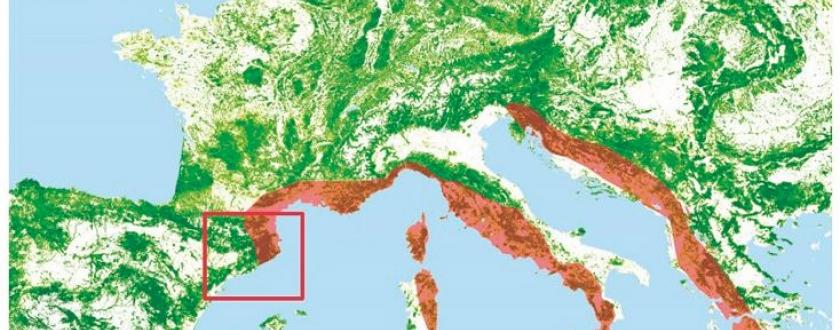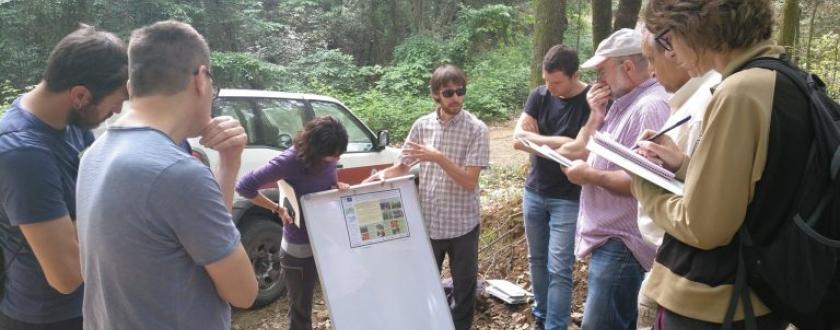LIFE MixForChange. Developing, implementing and demonstrating innovative forest management techniques in Catalonia
Description of the case study
The LIFE MIXforChange project contributes to adaptation and greater resilience of Europe's mixed sub-humid Mediterranean forests in the face of climate change by ensuring their conservation and maintaining their productive, environmental and social functions.
The project’s main challenge is to define new forest management models which address climate change, involving different types of formations within sub-humid Mediterranean forests. These natural formations constitute ecosystems which are highly vulnerable to climate change. One of the project’s greatest challenges is therefore to define specific management measures which can be put into practice immediately.
The main objectives of the project are as follows:
- Develop, implement and demonstrate innovative forest management techniques.
- Develop new tools for integrating the climate change adaptation of sub-humid Mediterranean forests into the policy and legal framework governing forest management.
- Develop new tools to strengthen the economy around products deriving from sub-humid Mediterranean forests, so as to foster the mid to long term economic sustainability of forest management for climate change adaptation and prevent the abandonment of forest activities.
- Transfer the techniques implemented and the tools developed to the main regional and European stakeholders in areas with sub-humid Mediterranean forests.
Project sites have been selected in the Catalan comarca of Ripollés and the Collsacabra mountain range within the Pyrenean area, in addition to other sites in the Montseny and Montnegre-Corredor mountain ranges.
The adaptation solutions taken forward in the project are as follows:
- Identification of reference stands for detailed study and the design of specific adaptation actions.
- Agreements signed with landowners for implementing demonstration projects on the forest estates selected.
- Implementation of innovative management models in forests mainly comprised of Quercus ilex subsp. ilex, Castanea sativa, oaks (Quercus petraea, Q. pubescens, Q. canariensis) and Pinus sp. over a total of 164 ha.
- Development of new tools to improve the economy around the management of sub-humid Mediterranean forests (quality-based tree classification protocols, research and cataloguing of high added value products, pilot logistics and marketing systems for non-processed forest products).
- Design of new tools for integrating climate change adaptation of sub-humid Mediterranean forests into policy and the legal framework (vulnerability models, technical and policy guidelines, review and adaptation of the legal framework).
- Assessment of the ecological, forestry and socio-economic impacts of the project using a highly precise annual monitoring system.
- Communication and dissemination directed at different target audiences (landowners, forestry experts and managers, local politicians and government, general public) at local and international level (including networking).
- Desarrollo de nuevas herramientas para mejorar la economía ligada a la gestión de los bosques subhúmedos mediterráneos (protocolos de clasificación de árboles según calidad, prospección y catálogo de productos de alto valor añadido, sistema piloto de logística y comercialización de productos forestales no transformados).
- Diseño de nuevas herramientas para integrar la adaptación al cambio climático del bosque subhúmedo mediterráneo en la política y marco normativo (modelos de vulnerabilidad, guías técnica y política, revisión y adaptación del marco normativo).
- Evaluación de los efectos ecológicos, selvícolas y el impacto socioeconómico del proyecto a través de un sistema de monitoreo anual de gran precisión.
- Acciones de comunicación y difusión dirigidas a los diferentes tipos de público objetivo (propietarios, técnicos y gestores forestales, políticos locales y administración, sociedad), con incidencia a nivel local e internacional (incluyendo networking).
Case study developed and implemented as a climate change adaptation measure.
Catalan Centre for Science and Technology (CTFC), Forest Ownership Centre (CFP), Association of Forest Owners of Serra de Bellmunt-Collsacabra (APFSBE) and the Association of Landowners of Montnegre Corredor (APMC).
Additional Information
The project is coordinated by the Catalan Centre for Science and Technology (CTFC) in collaboration with the Forest Ownership Centre (CFP), the Association of Forest Owners of Serra de Bellmunt-Collsacabra (APFSBE) and the Association of Landowners of Montnegre Corredor (APMC).
Success: project insisted on by forest owners and managers, who participate as project partners; implementation of pilot actions on private forest sites with a view to future integration of improvement methods into their actual management; strategy to improve productivity and value added of final products enables integration of the timber sector into the value chain strategy; proposed models included in the Sustainable Forest Management Guidelines for Catalonia (ORGEST); high level of stakeholder and town hall participation in networking events.
Limiting: need for specific grants for transferring forest management innovation to other landowners and regions; need to develop forest-level plans so that adaptation measures can be tailored; long timeframes for analysing the results of management models makes it difficult to ‘sell’ their benefits to forest managers.
The total project budget is €1,308,001, of which €781,229 has been funded by the EU LIFE Programme.
This project is funded by the EU LIFE Programme. It also contributes to meeting the objectives of the EU Adaptation Strategy (2013).
2016-2021 (4 years - in progress)
Reference information
PYRENEAN CLIMATE CHANGE OBSERVATORY
Avenida Nuestra Señora de la Victoria, 8
22.700 - Jaca
Huesca - España
+34 974 36 31 00
info_opcc@ctp.org






